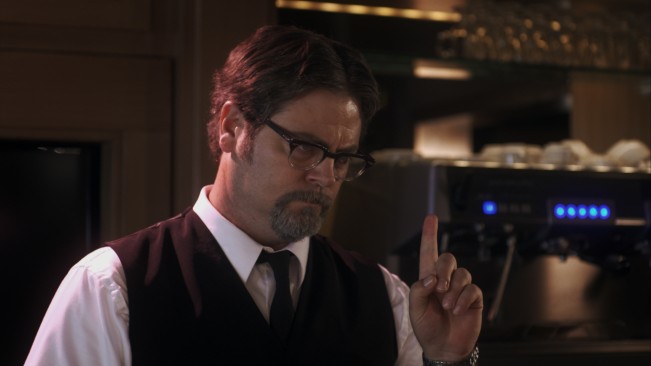By Ray Pride Pride@moviecitynews.com
TRIBECA FILM ACQUIRES NORTH AMERICAN RIGHTS TO SOMEBODY UP THERE LIKES ME
FOR IMMEDIATE RELEASE
Spring 2013 theatrical release set for Bob Byington’s offbeat SXSW comedy starring Keith Poulson, Nick Offerman and Jess Weixler
New York, NY – July 25, 2012 – Tribeca Film today announced it has acquired all North American rights to indie director Bob Byington’s deadpan comedy Somebody Up There Likes Me, starring Keith Poulson, Nick Offerman, and Jess Weixler. Produced by Hans Graffunder (Knight of Cups, To the Wonder) and Nick Offerman (“Parks and Recreation”), the film turned heads earlier this year when it world premiered at South by Southwest Film Festival in Austin – Byington’s home-base.
 Somebody Up There Likes Me marks a new, more scripted approach to filmmaking for Byington, whose signature freeform style defined films such as RSO (Registered Sex Offender) (2008) and Harmony and Me (2009). The endearing dry humor that made him a household name from Austin to Brooklyn, however, has not been lost. Indiewire calls it “a surreal comedy about the cycle of life” and “consistently silly and poignant at once.”
Somebody Up There Likes Me marks a new, more scripted approach to filmmaking for Byington, whose signature freeform style defined films such as RSO (Registered Sex Offender) (2008) and Harmony and Me (2009). The endearing dry humor that made him a household name from Austin to Brooklyn, however, has not been lost. Indiewire calls it “a surreal comedy about the cycle of life” and “consistently silly and poignant at once.”
Tribeca Film plans a theatrical Spring 2013 release day and date with on-demand platforms where it will be available in 40+ million homes through a variety of video-on-demand offerings, as well as iTunes, Amazon Watch Instantly, VUDU, Xbox and Samsung Media Hub. A strong U.S. and Canada Festival run is set for pre-release.
Byington creates an offbeat energy by brilliantly pairing established actors and non-actors in this comedic fable about a man watching his life fly by. Max (Keith Poulson), along with his best friend Sal (Nick Offerman, “Parks & Recreation”) and the woman they both adore, Lyla (Jess Weixler, Teeth), stumble through thirty-five years of seemingly mandatory but unfulfilling entanglements. Featuring an original score from Vampire Weekend’s Chris Baio, stunning animated sequences from Bob Sabiston (A Scanner Darkly), produced by Offerman and directed by cult auteur Bob Byington (Harmony and Me), the experience of life sneaking up on you while time appears to stand still has never been more surreal and charmingly entertaining.
“Somebody Up There Likes Me displays all the quirkiness, personality, and distinction that defines independent filmmaking,” said Geoffrey Gilmore, Chief Creative Officer of Tribeca Enterprises. “Infused with a biting, dry sense of humor and filled with wonderful performances from a talented cast, Bob Byington’s latest film reaffirms his reputation for being one of the most wonderfully idiosyncratic directors at work today. Although the destination is familiar, the path that Byington charts is unexpected, strange and utterly unique.”
“Very gratified that Tribeca responded to the film, and that Mr. Gilmore, who is a cinema icon, would put energy into releasing the film. Pleased to have made a film with a great team, and to be releasing the film with a team that is on par,” said director Bob Byington.
“Little films like ours are made exponentially more buoyant by the tender ministrations of a company like Tribeca. Finding ourselves in their tasteful clutches makes me as happy as a clam at high water,” said actor/producer Nick Offerman.
The deal was negotiated for Tribeca Film by Nick Savva, Director of Acquisitions, and on behalf of the filmmakers by attorney Andre Des Rochers from Gray Krauss Stratford Des Rochers LLP. Faliro House also produced along with executive producers Stuart Bohart, Morgan Coy, Christos V. Konstantakopoulos, and Brenda Greene Mitchell.
For additional information please visit www.facebook.com/somebodyuptherelikesme
About Tribeca Film
Tribeca Film is a comprehensive distribution label dedicated to acquiring and marketing independent films across multiple platforms, including video-on-demand, theatrical, digital, home video and television. It is an initiative from Tribeca Enterprises designed to provide new platforms for how film can be experienced, while supporting filmmakers and introducing audiences to films they might not otherwise see. American Express continues its support of Tribeca and the independent film community by serving as the Founding Partner of Tribeca Film.
# # #













